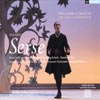Handel Serse
There’s much more to Serse than the ‘Largo’ – the proof is in this set
View record and artist detailsRecord and Artist Details
Composer or Director: George Frideric Handel
Genre:
Opera
Label: Veritas
Magazine Review Date: 2/2005
Media Format: CD or Download
Media Runtime: 166
Mastering:
Stereo
DDD
Catalogue Number: 545711-2

Tracks:
| Composition | Artist Credit |
|---|---|
| Serse, 'Xerxes' |
George Frideric Handel, Composer
(Les) Arts Florissants Chorus (Les) Arts Florissants Orchestra Anne Sofie von Otter, Serse, Mezzo soprano Antonio Abete, Elviro, Bass Elizabeth Norberg-Schulz, Romilda, Soprano George Frideric Handel, Composer Giovanni Furlanetto, Ariodate, Bass Lawrence Zazzo, Arsamene, Countertenor Sandrine Piau, Atalanta, Soprano Silvia Tro, Amastre, Mezzo soprano William Christie, Conductor |
Author: David Vickers
Serse was Handel’s last opera created for the King’s Theatre, scene of most of his operatic triumphs in London since 1711. By April 1738, Handel’s opera audience was waning, and Serse was only performed five times. But it would be a mistake to view Handel’s last few operas in a negative light: legends that he was struggling financially have been exploded by analyses of his royal pensions and Bank of England accounts, and recent recordings of Imeneo (CPO, 5/04) and Deidamia (Virgin, 11/03) have proved that the paltry audiences for Handel’s last few Italian operas do not reflect any drop in musical and dramatic quality.
Among his late operas, only Serse has been consistently popular in modern times, and its opening number has attained immortality as the ‘Largo’ (actually, the tempo marking for ‘Ombra mai fù’ is larghetto, not that the ever-indulgent William Christie cares!).There is infinitely more to the piece than its most famous and least fascinating aria: Handel’s genius for dramatic pacing and concise musical personalities abounds. It has been best served by a lively, attractive performance by Nicholas McGegan and the Hanover Band, but that complete version was hampered by a couple of principals past their vocal prime. Christie’s live recording shares with McGegan’s a warm and theatrical approach to Handel’s music, an excellent orchestra, incisive chorus, and impressively sung secondary roles that cover for a few vocal inadequacies elsewhere.
Von Otter is usually an exemplary Handel singer, and although she characterises the unpredictable, selfish King of the title well enough, her performance in the title-role is surprisingly prone to harshness. Elizabeth Norberg-Schulz has recorded a major Handel opera role before (Asteria in Tamerlano: Avie, 7/02), and her performance of Romilda is similarly unconvincing. The role of Arsamene is not a comfortable fit for countertenors, but Lawrence Zazzo confirms his growing reputation in several stunning arias and some committed acting. Sandrine Piau is outstanding as the scheming Atalanta, Silvia Tro Santafé is a powerful Amastre, and the comic bass roles are given plenty of wit and gusto by Giovanni Furlanetto and Antonio Abete (although the camped-up countertenor of the disguised Elviro becomes irritating).
Despite a few momentary flaws, Christie masterminds an entertaining performance that captures the flavour and personality of Handel’s imagination. After a lacklustre Alcina (Erato, 3/00), it is pleasing to hear Les Arts Florissants return to their best form in Handel opera. Christie is better represented by this amiable performance of an opera that frequently inclines towards comedy, although that label has to be used carefully because Handel always has something serious and poignant to say. The best aspects of McGegan’s interpretation should not be overlooked, but this new recording captures a theatrical flow and affectionate atmosphere that is deeply satisfying.
Among his late operas, only Serse has been consistently popular in modern times, and its opening number has attained immortality as the ‘Largo’ (actually, the tempo marking for ‘Ombra mai fù’ is larghetto, not that the ever-indulgent William Christie cares!).
Von Otter is usually an exemplary Handel singer, and although she characterises the unpredictable, selfish King of the title well enough, her performance in the title-role is surprisingly prone to harshness. Elizabeth Norberg-Schulz has recorded a major Handel opera role before (Asteria in Tamerlano: Avie, 7/02), and her performance of Romilda is similarly unconvincing. The role of Arsamene is not a comfortable fit for countertenors, but Lawrence Zazzo confirms his growing reputation in several stunning arias and some committed acting. Sandrine Piau is outstanding as the scheming Atalanta, Silvia Tro Santafé is a powerful Amastre, and the comic bass roles are given plenty of wit and gusto by Giovanni Furlanetto and Antonio Abete (although the camped-up countertenor of the disguised Elviro becomes irritating).
Despite a few momentary flaws, Christie masterminds an entertaining performance that captures the flavour and personality of Handel’s imagination. After a lacklustre Alcina (Erato, 3/00), it is pleasing to hear Les Arts Florissants return to their best form in Handel opera. Christie is better represented by this amiable performance of an opera that frequently inclines towards comedy, although that label has to be used carefully because Handel always has something serious and poignant to say. The best aspects of McGegan’s interpretation should not be overlooked, but this new recording captures a theatrical flow and affectionate atmosphere that is deeply satisfying.
Discover the world's largest classical music catalogue with Presto Music.

Gramophone Digital Club
- Digital Edition
- Digital Archive
- Reviews Database
- Full website access
From £8.75 / month
Subscribe
Gramophone Full Club
- Print Edition
- Digital Edition
- Digital Archive
- Reviews Database
- Full website access
From £11.00 / month
Subscribe
If you are a library, university or other organisation that would be interested in an institutional subscription to Gramophone please click here for further information.




